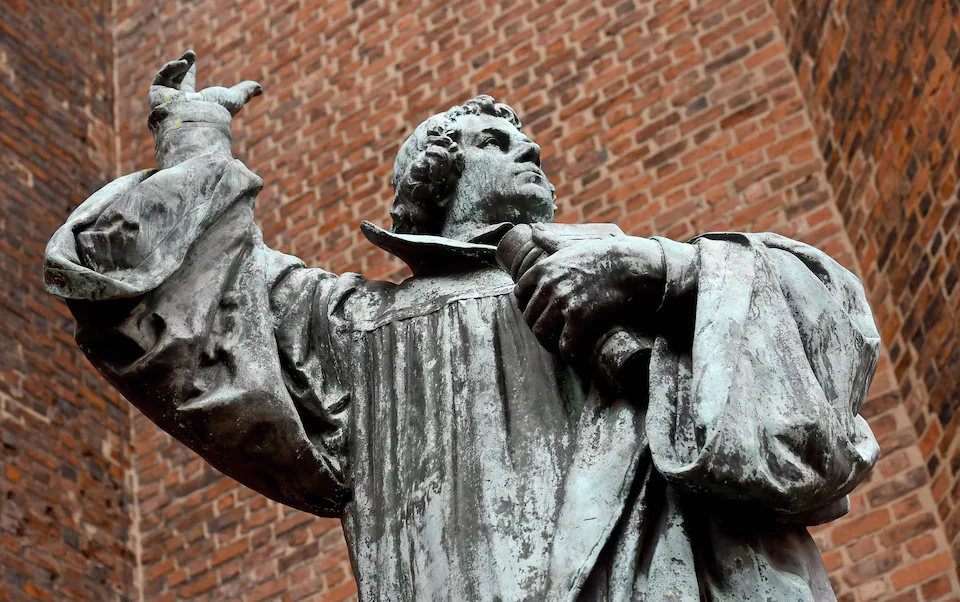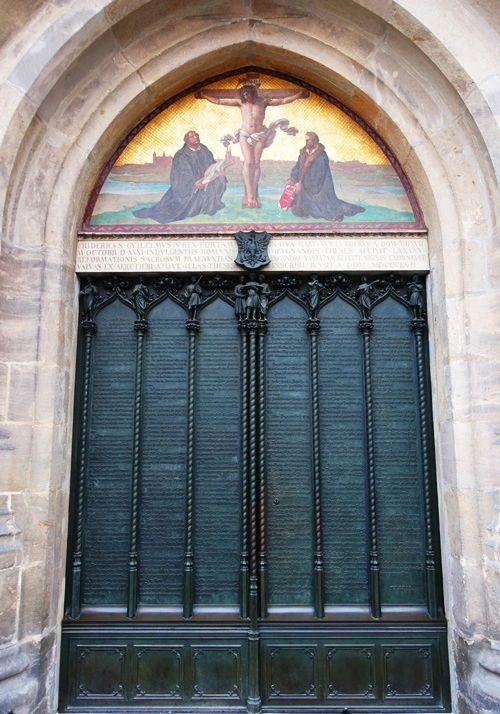
-a bronze statue of Martin Luther in Hanover, Germany.
-by Katherine Arcemont, The Washington Post
October 31, 2017
“It was the original viral post.
On Oct. 31, 1517, an obscure German professor of theology named Martin Luther launched an attack on the Roman Catholic Church by nailing his 95 Theses to the door of Wittenberg’s Castle Church — a story that has been repeated for hundreds of years. Luther’s act of rebellion led to the Protestant Reformation, which is being marked by millions of Christians around the world Tuesday on its 500th anniversary.
But did that dramatic moment — Luther defiantly hammering his critique to the church door — really happen?
The story was first told by Philipp Melanchthon, a fellow professor at the University of Wittenberg, a close friend of Luther’s and a leader of the Reformation, after Luther’s death in 1546. And the church door did serve as a public bulletin board of sorts.
But Melanchthon was not in Wittenberg on the day he supposedly witnessed the nailing. He didn’t join the university faculty until 1518. And Luther, a prolific writer who published 30 pamphlets in three years and later translated the Bible into German, never recounted the story.
In 1961, Erwin Iserloh, a Catholic Luther researcher, argued that there was no evidence that Luther actually nailed his 95 Theses to the Castle Church door. Indeed, at the 1617 celebration of the Reformation, Luther was depicted as writing the 95 Theses on the church door with a quill.
Iserloh’s assertion set off a debate among Luther historians that remains unresolved.
A decade ago, Martin Treu, who works for the Luther Memorials Foundation of Saxony-Anhalt, discovered a handwritten note by Luther’s secretary, Georg Rörer, made in a revised copy of the New Testament before Luther’s death. It reads: “On the evening before All Saints’ Day in the year of our Lord 1517, theses about letters of indulgence were nailed to the doors of the Wittenberg churches by Doctor Martin Luther.”
While Rörer was also not an eyewitness, Treu noted, “he was one of Luther’s closest staff.” Treu’s conclusion: 95 Theses may have been nailed to several church doors in Wittenberg, not just at Castle Church.
What’s not in dispute: Luther mailed his attack on the Catholic sale of indulgences to the archbishop of Mainz and Magdeburg, Albert of Brandenburg, on Oct. 31, 1517. The indulgences were meant to assure their buyer that their sins would be forgiven — a form of corruption in Luther’s eyes.
“Disputation on the Power and Efficacy of Indulgences” quickly spread across Europe and reached Pope Leo X sometime in 1518. After a series of disputes, Luther was excommunicated from the Catholic Church on Jan. 3, 1521.
The theologian became a celebrity, and with his celebrity came a following and a new religion: Lutheranism. And the founding symbol of the Protestant Reformation remains the door of Castle Church, now inscribed in bronze with Luther’s 95 Theses.”

-bronze doors of Castle Church in Wittenberg, Germany now cast in bronze containing Luther’s 95 theses.

-by Joseph Heschmeyer, a former lawyer and seminarian, he blogs at Shameless Popery.
“On October 31, 1517, Martin Luther posted his Ninety-five Theses against papal indulgences, or the atonement of sins through monetary payment, on the door of the church at Wittenberg, Germany.” That line from a piece by David B. Morris posted by the Library of Congress on its website (“Martin Luther as Priest, Heretic, and Outlaw”) summarizes the popular view of how the Reformation began. But it’s rife with errors.
To start with the most trivial, the popular image of Luther nailing his theses to the church door is almost certainly a Protestant fiction. Joan Acocella, in a piece for the New Yorker (“How Martin Luther Changed the World,” Oct. 30, 2017), points out that modern scholars
“…differ on many points, but something that most of them agree on is that the hammering episode, so satisfying symbolically—loud, metallic, violent—never occurred. Not only were there no eyewitnesses; Luther himself, ordinarily an enthusiastic self-dramatizer, was vague on what had happened. He remembered drawing up a list of ninety-five theses around the date in question, but, as for what he did with it, all he was sure of was that he sent it to the local archbishop.”
Acocella also points out that the theses were not “a set of non-negotiable demands about how the Church should reform itself in accordance with Brother Martin’s standards,” but rather “like all ‘theses’ in those days, they were points to be thrashed out in public disputations, in the manner of the ecclesiastical scholars of the twelfth century.”
In terms of more serious errors, what was at the heart of the 95 Theses? According to Morris, Luther was protesting “papal indulgences, or the atonement of sins through monetary payment.” Wrong. Luther not only defended papal indulgences, the only anathema in the entirety of the 95 Theses was his Thesis #71: “Let him who speaks against the truth concerning papal indulgences be anathema and accursed.” In other words, the people that Martin Luther condemned weren’t Catholics but (modern) Protestants.
Nor are indulgences “the atonement of sins through monetary payment.” Not only do indulgences not bring about our atonement, “an indulgence is a remission before God of the temporal punishment due to sins whose guilt has already been forgiven” (Pope Paul VI, Indulgentiarum Doctrina, norm. 1). Our atonement is won not by monetary payment but by Jesus on Calvary. As St. Thomas Aquinas says, “Christ’s Passion was not only a sufficient but a superabundant atonement for the sins of the human race” (Summa Theologica III:48:2).
So, if the popular theory of Luther’s protest is almost entirely wrong, what’s the truth of it? Luther’s argument was multipronged (there’s a reason there were 95 theses) and a mix of good and bad. Part of his dispute was over the nature and extent of indulgences: where the pope derived the power to grant indulgences and the kinds of penalties that could be remitted through an indulgence.
Luther, who still believed in purgatory at that point, argued that the “power which the pope has in general over purgatory corresponds to the power which any bishop or curate has in a particular way in his own diocese and parish” (Thesis 25). Luther’s views here are idiosyncratic, and neither Protestants (who quickly gave up on indulgences and purgatory) nor Catholics have attempted seriously to defend them.
More significant was Luther’s critique not of indulgences as such but of the sale of indulgences. He rejected the teachings of indulgence preachers (Johann Tetzel, O.P. and others) who “say that as soon as the money clinks into the money chest, the soul flies out of purgatory,” countering that “it is certain that when money clinks in the money chest, greed and avarice can be increased; but when the church intercedes, the result is in the hands of God alone” (Theses 27-28).
Luther was largely correct on this point. After all, while indulgences don’t bring about our atonement (as Luther well knew), they are a spiritual good. And the sale of spiritual goods is anathema to Christianity, the sin of simony, named after the unhappy Simon Magus:
Now when Simon saw that the Spirit was given through the laying on of the apostles’ hands, he offered them money, saying, “Give me also this power, that any one on whom I lay my hands may receive the Holy Spirit.” But Peter said to him, “Your silver perish with you, because you thought you could obtain the gift of God with money!” (Acts 8:18-20).
There’s a long history in the Church both of simony popping up and of the Church condemning it. The second canon of the Council of Chalcedon (451 AD) ordered that “if any bishop performs an ordination for money and puts the unsaleable grace on sale,” he was upon conviction to “lose his personal rank,” while the ordained lost “the dignity or responsibility” he had attempted to purchase. A cleric found to have served as a go-between was likewise “demoted from his personal rank,” or, in the case of laymen and monks, anathematized.
So Luther stood in a long (and holy) tradition of rejecting simony, and the Council of Trent vindicated him on this point. The Council, desiring that “the abuses which have crept therein, and by occasion of which this honorable name of indulgences is blasphemed by heretics, be amended and corrected,” explicitly outlawed “all evil gains” for the obtaining of indulgences (“Decree on Indulgences”).
But that still leaves a question: how did these abuses happen in the first place? How hard is it to simply not sell spiritual goods? Well, a bit harder than it seems. One way of answering would be to trace the precise history: canon 2 of the Council of Clermont (1095 AD) decreed that “whoever for devotion alone, and not for the purpose of gaining honor or money, heads for Jerusalem to liberate the Church of God, that expedition is to be imputed to him [as satisfaction] for all penance.” That makes sense: what’s more worthy of an indulgence than risking your life to defend the Church?
Later Crusades expanded beyond the careful nuance of the Council of Clermont, offering indulgences through what became known as “vow redemption.” In short, those unable (due to age or illness) to go on crusade were given the opportunity to receive an indulgence by paying for someone else to go. And again, the expansion makes a sort of sense: it seems unfair to deprive someone of an indulgence when they were ready and willing but physically unable to go on crusade.
But this expansion was controversial in its day. In the thirteenth century, Thomas of Cantimpré, O.P., complained that indulgences were being acquired for relatively trivial amounts, amounting to as little as one percent of a person’s moveable wealth (Christoph T. Maier, Preaching the Crusades, 155-56). And it was only a short step from this point to the Church in Luther’s day, when preachers such as Tetzel made indulgences sound like purchasable get-out-of-purgatory-free tickets.
But tracing the history of the sale of indulgences is incomplete if we don’t also recognize the spiritual tightrope walked by the medieval Church and by all of us today. All Christians (whether they believe in indulgences or not) need to grapple with two core Christian ideas: first, that God really does reward generosity; and second, that it’s impossible to bribe God and evil to try. How we understand (and even “balance”) these two ideas makes a world of difference, since they sit in what seems like an uneasy, even paradoxical, relationship with one another.
This paradox is captured in the thirty-fifth chapter of the book of Sirach. In verses 10-11, the goodness of giving back to God is proclaimed: “Give to the Most High as He has given, and as generously as your hand has found. For the Lord is the One Who repays, and He will repay you sevenfold.” But in the next verse, there’s immediately a warning against transactional spirituality: “Do not offer Him a bribe, for He will not accept it; and do not trust to an unrighteous sacrifice; for the Lord is the judge, and with Him is no partiality.” In other words, give generously to God, Who will reward your generosity, but don’t think that you bribe Him or buy heaven.
While those verses from Sirach aren’t in Protestant Bibles, the underlying ideas are. St. Paul reminds the Corinthians to give generously since “God loves a cheerful giver” and “he who sows sparingly will also reap sparingly, and he who sows bountifully will also reap bountifully” (2 Cor. 9:6-7). He continues:
He who supplies seed to the sower and bread for food will supply and multiply your resources and increase the harvest of your righteousness. You will be enriched in every way for great generosity, which through us will produce thanksgiving to God; for the rendering of this service not only supplies the wants of the saints but also overflows in many thanksgivings to God (2 Cor. 9:10-12).
St. Paul hints at the fact that God may give us rewards in this life, saying that “God is able to provide you with every blessing in abundance, so that you may always have enough of everything and may provide in abundance for every good work” (2 Cor. 9:8). But God’s generosity is no less true in terms of heavenly rewards. As Jesus says to the rich young man, “If you would be perfect, go, sell what you possess and give to the poor, and you will have treasure in heaven; and come, follow me” (Matt. 19:21).
Tobit 12:8-9 (also not in Protestant Bibles) says that “prayer is good when accompanied by fasting, almsgiving, and righteousness. A little with righteousness is better than much with wrongdoing. It is better to give alms than to treasure up gold. For almsgiving delivers from death, and it will purge away every sin.”
Jesus describes this as a sort of spiritual fortune-building: “Sell your possessions, and give alms; provide yourselves with purses that do not grow old, with a treasure in the heavens that does not fail, where no thief approaches and no moth destroys. For where your treasure is, there will your heart be also” (Luke 12:33-34). And “give, and it will be given to you; good measure, pressed down, shaken together, running over, will be put into your lap. For the measure you give will be the measure you get back” (Luke 6:38).
The idea that giving generously ensures spiritual riches in heaven isn’t some medieval corruption of the gospel: the Bible actually teaches it. And yet we have, alongside this message, warnings such as Sirach 35:12 and Acts 8:18-20 telling us not to try to buy the spiritual gifts of God.
The easy—and hard—answer is to love God for His own sake and before all else. Those rewards aren’t bad: it’s good that God blesses generous givers, and that He answers prayers, and that He considers our meager almsgiving seriously. But the spiritual life was never about the rewards and must never become about the rewards. The gifts God gives are to draw us to Him and to reveal something about His generous and loving nature, not to replace Him. After all, God wants to give us not merely some reward but Himself.
Jesus is happy to multiply loaves to feed the hungry crowds. But He’s also quick to warn them not to follow Him for that reason. A day after the feeding of the 5,000 (John 6:1-14), Jesus rebuked His followers, saying, “you seek Me, not because you saw signs, but because you ate your fill of the loaves” (v. 26). It’s easy for us to judge His hungry followers, just as it’s easy to judge the medieval Christians giving money to try to get indulgences for their loved ones. But before we do that, it’s worth asking: are we so different today?”
Love & truth,
Matthew









